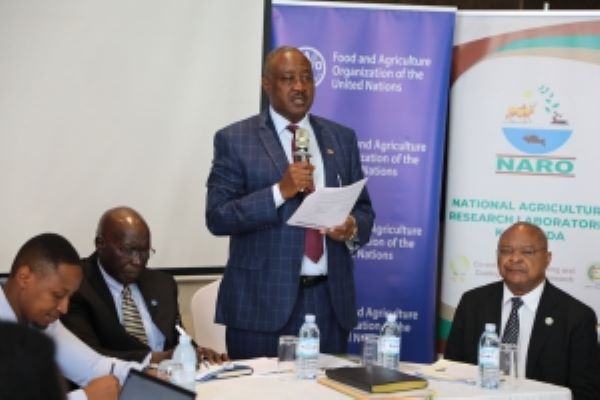
The Food and Agriculture Organization of the United Nations (FAO) and the Inter-governmental Authority for Development (IGAD) held a joint consultative workshop on biological control for pest management in Eastern Africa to highlight ecological methods of managing plant pests sustainably.
The consultative workshop was held in Kampala, Uganda, from 27 to29 June 2023, in the presence of experts and researchers, respectively, of the National Plant Protection Organization and of the National Agricultural Research Organizations of the nine SFE countries (Burundi, Djibouti, Eritrea, Ethiopia, and Kenya, Rwanda, Somalia, South Sudan and Uganda). Other relevant stakeholders also participated.
Speaking at the event, Chimimba David Phiri, FAO Subregional Coordinator for Eastern Africa, observed the recurrent threat of pests of plants, which continues to pose significant challenges to sustainable food production. Farmers’ continued reliance solely on conventional pest management methods, such as chemical pesticides, has proved insufficient to suppress plant pest problems. When not used properly, chemical pesticides harm the environment and human health, making it imperative to seek environmentally friendly alternatives. Achieving this requires adopting biological control and biopesticides in agricultural production, an approach that harnesses the power of nature itself to manage pests of plants. Phiri added, “By utilizing natural enemies of pests, such as predatory arthropods and beneficial microorganisms, we can mitigate pest problems and restore the delicate balance of ecosystems while sustainably protecting the health of crops”.
On his part, Kenneth Mwangi, Project Lead for the Platform on Transboundary Pests from IGAD Climate Prediction and Applications Centre (ICPAC), noted that climate change has caused pests to become more migratory while endemic plant pests are spreading and multiplying in the region. He acknowledged that the consultative workshop, which he said has offered a start to IGAD’s support to countries, would help further the development of regulations through harmonized guidelines on the registration and adoption of biopesticides. He added that adopting biopesticides and improved engagement at technical and policy levels is “important to tackle food insecurity through the food systems approach. Management of transboundary pests while sustaining environmental safety is crucial. When scientists work with or through nature to control emerging challenges like pest invasions, the benefits are economic, environmental, and human health.”
Stephen Byantwale, Acting Director of Crop Resources at Uganda’s Ministry of Agriculture, Animal Resources, Irrigation and Fisheries, welcomed the initiative and related agriculture’s challenges with frequent plant pest outbreaks. He affirmed his government’s commitment to using sustainable and environmental approaches and indicated that the government has prioritized this in the national development strategy. He added that overreliance on the traditional use of conventional pesticides has a deleterious effect on food, health and trade, and therefore a change in direction was urgently needed to protect food and nutrition.
The meeting agreed that biopesticides, derived from natural sources, offer attractive alternatives to synthetic chemical pesticides and contribute to minimizing the risks associated with their use. Participants reflected on constraints to the adoption of biological control and biopesticide use in Africa, consisting of the lack of understanding of these technologies, their potential and advantages, insufficient regulatory frameworks for registering and releasing these products onto the market, and inadequate infrastructure facilities required to improve farmer access to these products.
As a solution, participants suggested that awareness creation on biological control and biopesticides to relevant stakeholders; development of capacities to ensure the effective uptake of these technologies in agricultural production; research and development in the area of biological control of high-priority pests, especially under field conditions; and improving regulatory frameworks for biocontrol products in Eastern Africa are critical.
Representatives from the Centre for Agriculture and Bioscience International (CABI), International Centre of Insect Physiology and Ecology (ICIPE), and Desert Locust Control Organization for Eastern Africa (DLCO-EA) indicated an interest in furthering the development of biopesticides and collaborating with FAO and the countries.
Biological control – fundamental to effective pest management
Globally, crop losses due to pests are increasing at an alarming rate, necessitating the use of Integrated Pest Management (IPM) strategies that are environmentally friendly and sustainable. Biological control agents are the most ecosystem-friendly, sustainable and cost-effective pest management method. Applying biological control and biologicals in pest management in agricultural production is an approach to reducing the use of synthetic chemical pesticides and the associated adverse effects on human health and the environment.
With its diverse ecosystems and agricultural potential, the Eastern African subregion stands to gain significantly from embracing sound ecological pest management practices. By harnessing the power of biological control, East African countries can reduce their reliance on synthetic chemical pesticides, realize substantial economic savings, improve biodiversity and preserve their natural habitats, such as safeguarding pollinators and reducing exposure to chemical pesticides in our ecosystems. The FAO Subregional Office for Eastern Africa is currently supporting several initiatives on biological control of pests, such as the mango mealybug (Rastrococcus invadens) in several countries in Eastern Africa. It collaborates with actors such as the Intergovernmental Authority for Development (IGAD) in the management of a range of economically significant plant pests such as the desert locust (Schistocerca gregaria) and fall armyworm (Spodoptera frugiperda) in the subregion.
Related Links:







